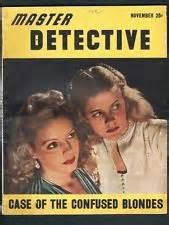Sundog Rising!
Reflections on living the life literary by the Urban Sundog
It’s A Mystery! Wasn’t It?
For most people, Sherlock Holmes will always be the first.
Arthur Conan Doyle published the first Holmes story in 1887. And thus the mystery/thriller/investigator genre was born. Except not really. There were a few pretenders to the form before that.
And illustrious pretenders they were! Working backwards, in 1868 Wilkie Collins wrote The Moonstone, with Sergeant Cuff, a novel which no less an authority on matters literary than T.S. Eliot considered to be the true original of the mystery/detective vein. But even before Collins, Wilkie’s pal the redoubtable Charles Dickens published Bleak House in 1852 with the highly efficient Inspector Bucket solving a murder. And American Edgar Allan Poe trumped them both with his French detective, C. Auguste Dupin in 1841 with “The Murders in the Rue Morgue”.
It’s always interesting to look back and determine where expectations come from in any genre. For a mystery, it is certainly generally accepted today you need some central crime, generally a murder, with an investigator, either an amateur genius or more commonly today a police professional of some kind, rounding up the suspects from a closed circle of possibilities and restoring order to the universe at the end by successfully naming the culprit and bringing him or her to some sort of generally accepted form of justice.
Feed us that formula and we will be endlessly gratified. But what about the writers who had to ply their trade before the formula was generally accepted?
The mystery derives most of its appeal from two factors: the central question of whodunnit the reader wants answered, and the suspense that arises along the way. There needs to be an ominous atmosphere of fear that the culprit is going to get away with the crime, and maybe take a few more bodies with him along the way. With the investigator needing to overcome enormous obstacles to justice to bring the villain down, some personal, some provided by the threatening cleverness of the antagonist, some bureaucratically imposed upon the struggling hero.
And a good writer keeps their reader guessing. He or she never gives them absolutely everything they need to know. The reader has to work out the solution as much as the investigator does. It’s a race through the book, to see who comes to the right conclusion first. Hopefully skillfully managed by a fair yet tricksy author. Who is capable of coming up with a solid resolution to an intriguing question in the first place. Unfortunately, it’s a lot easier to come up with a good mystery than it is to come up with a satisfying ending to a mystery. See last season’s Red John episodes of The Mentalist on television as a horrifying example of this sort of failure.
So with all that in mind, I found a certain sentence I came to while reading The Eustace Diamonds by Anthony Trollope last week quite fascinating.
To my knowledge, no one has ever claimed Anthony Trollope had anything to do with the development of the mystery/thriller genre. Nevertheless, in certain novels — such as The Last Chronicle of Barset (1867 — between Poe and Collins) — a central question you may or may not want to call a mystery is fundamental to the story. In The Last Chronicle Trollope lets the reader know in the first chapter that whether or not a certain clergyman stole some money or not is going to have a major effect on practically every other plotline in the book. And it is only through some genuine amateur sleuthing that doesn’t play out until close to the end of the book that you find out if the clergyman is innocent or not.
The Eustace Diamonds — published in 1871, after Collins but before Sherlock Holmes — may be the closest thing Trollope ever wrote to a straight thriller. The plot hinges on Lizzie Eustace laying claim to diamonds that may or may not be hers — and then they’re stolen. Or are they? Sounds like a mystery to me.
So I find it very interesting when Trollope, stepping in with his own voice as the author, tells us precisely where the diamonds have disappeared to, even though the reader has no idea how many of the characters are aware of that fact; and Anthony further endorses this information by telling us “The chronicler states this at once, as he scorns to keep from his reader any secret that is known to himself.”
Now, that’s different.
In fact Trollope states repeatedly through the book that he feels he has an obligation to reveal everything about the plot to the reader concerning aspects of the story that would normally be emphasized today by their omission to heighten the mystery and suspense. He feels not doing so would be a violation of a certain trust between writer and reader. So what might be genre expectations today were regarded quite differently over a century ago. The question is, does that invalidate the book as a good thriller read?
Not for a moment! The reader might know as much as the author does at any particular moment in The Eustace Diamonds, but you’re still not going to discover how it all plays out any faster than Trollope cares to tell us. To some extent the recognizable bones of what we now know to be the thriller are there in Trollope’s novel. But it’s still primarily a novel of the Anthony Trollope genre, and no real other. Providing double satisfaction then, as a nascent mystery read and a solid, reliable Trollope book.
On this occasion, I will not stoop to the obvious joke about the benefits of a solid, reliable Trollope because the above conclusion emphasizes a familiar point I’d like to make yet again …
Genre expectations are becoming the death of the imagination! The best books are those that dare to go anywhere, using what works best from tradition — any tradition! — as is appropriate for the story being told, and who cares if it’s a mystery, a fantasy, a western, a space opera, a vampire shocker, nouveau romans or any combination of the above!
If you want to write to the expectations, fine. More power to you. But the best literary investigators all added something to the genre by working beyond the expectations. So don’t impose those limitations on anyone trying to stretch the boundaries a little by putting together what works for something farther reaching. There are no rules for art. Only business. Don’t let the restrictions of “we only sell what we know we were able to sell before” stop you from thinking. Either as a writer or a reader. These guys didn’t.
*****
BOOK LAUNCH!
Continuing the Grand Tradition! With her own spin …
Local writer Cathy MacDonald debuts her first mystery novel
Put on the Armour of Light
from Dundurn Press, at McNally Robinson Bookstore in Winnipeg
on November 30, 2014, 2 pm in the Atrium.
For more information on Cathy and her sleuth Charles Lauchlan, check out her website at:
http://www.charleslauchlan.com/
and blog at:
www.portageandslain.com
*****
REALITY FICTION AND BEYOND!
This week:
Continuing The Twitchy Gal with Chapter Twenty-Three posted on Monday and Chapter Twenty-Four coming on Friday, October 31st at:
http://realficone.blogspot.ca/
The evil clones start coming out of the woods, plus an always popular satyr-chase! Meanwhile, Allen the Alien prepares to leave …









































